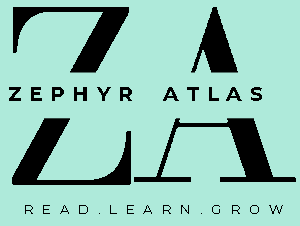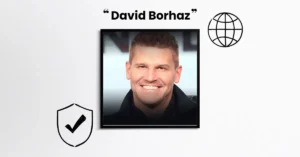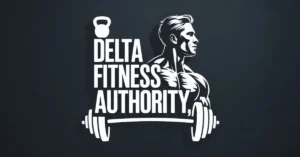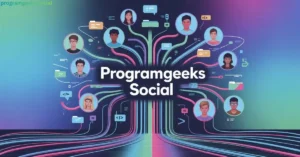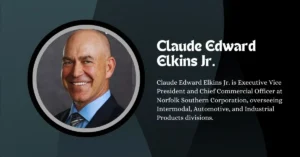Many leaders talk about “knowing the floor,” but few built a career from the yard to the boardroom. If you want practical leadership lessons for logistics, ops, or commercial strategy, this profile cuts to the chase. Claude Edward Elkins Jr. rose from a Road Brakeman in 1988 to Executive Vice President and Chief Commercial Officer. He oversees customer-facing divisions across Norfolk Southern’s eastern U.S. network, where rail moves more than 7 million carloads annually. A recent company brief and industry reporting describe measurable service and intermodal gains under current commercial priorities.
Instant Answer
Claude Edward Elkins Jr. is Executive Vice President and Chief Commercial Officer at Norfolk Southern Corporation, overseeing Intermodal, Automotive, and Industrial Products divisions.
Rising from a Road Brakeman in 1988, he combines hands-on railroad experience with strategic commercial leadership, driving operational efficiency, customer engagement, and industry innovation across Norfolk Southern’s eastern U.S. network.
Comprehensive Profile Table

| Category | Details |
|---|---|
| Full Name | Claude Edward Elkins Jr (also known professionally as Ed Elkins) |
| Current Role (2025) | Executive Vice President & Chief Commercial Officer, Norfolk Southern Corporation |
| Previous Role(s) | EVP & Chief Marketing Officer; Vice President Industrial Products; Group VP Chemicals Marketing; Intermodal Marketing Leader |
| Years at Norfolk Southern | 34+ years (Joined in 1988) |
| Industry | Freight Rail, Intermodal Logistics, Industrial Products, Transportation |
| Early Career Start | Hired as a Road Brakeman in 1988 after U.S. Marine Corps service |
| Operational Roles Held | Road Brakeman, Conductor, Locomotive Engineer, Relief Yardmaster |
| Marketing & Commercial Roles | Two decades in Intermodal Marketing; Leadership roles in Chemicals, Industrial Products, Automotive, and Logistics |
| Current Executive Oversight | Intermodal Division, Automotive Shipping, Industrial Products, Real Estate, Industrial Development, Short Line Marketing, Field Sales, Customer Logistics |
| Military Background | United States Marine Corps veteran |
| Education | B.A. in English, University of Virginia’s College at Wise |
| Graduate Education | MBA, Old Dominion University (Port & Maritime Economics concentration) |
| Executive Education Certificates | Harvard Business School; UVA Darden School of Business; University of Tennessee Supply Chain Institute |
| Industry Leadership Roles | Board Member, National Association of Manufacturers (NAM); Board Member, TTX Company |
| Professional Associations | Traffic Clubs of Chicago, New York, and Pittsburgh; North American Rail Shippers Association; Georgia State University Marketing RoundTable |
| Community & Civic Work | Contributor to industry mentorship programs, community engagement via rail associations; leadership involvement with East Lake Foundation and Georgia Chamber |
| Known For | Rising from brakeman to C-suite; pioneering intermodal growth; commercial strategy; customer-centric leadership; operational resilience; long-term rail industry innovation |
| Key Strengths & Expertise | Freight rail operations, intermodal logistics, supply chain strategy, commercial leadership, customer engagement, enterprise growth strategy |
| Notable Achievements | Led major commercial transformations; strengthened intermodal network; expanded customer relationships; recognized voice in rail industry modernization |
| Place of Origin | Southwestern Virginia, USA |
| Professional Reputation | Operationally grounded executive known for resilience, strategic clarity, and a customer-first leadership philosophy |
| Public Mentions & Media | Featured in Progressive Railroading, Trains Magazine, Bloomberg executive profiles, Norfolk Southern leadership releases |
What Is Claude Edward Elkins Jr.’s Role at Norfolk Southern?
Claude Edward Elkins Jr. is EVP and Chief Commercial Officer, overseeing Intermodal, Automotive, Industrial Products, Real Estate, and Customer Logistics.
What that looks like in practice:
- He sets commercial strategy across major revenue streams.
- He coordinates Field Sales, Short Line Marketing, and Industrial Development.
- He links pricing, capacity, and service targets to operational metrics.
Key Intake: He manages commercial execution across multiple divisions and acts as the bridge between customers and operations.
How Did Ed Elkins Advance from Brakeman to Executive?

He began as a Road Brakeman in 1988, moved to Conductor, Locomotive Engineer, and Relief Yardmaster, then spent ~20 years in Intermodal Marketing before reaching the C-suite.
Career architecture and lessons:
- Timeline table: 1988 (Brakeman) → 2000s (Intermodal Marketing) → 2016 (Group VP, Chemicals Marketing) → 2018 (VP, Industrial Products) → 2021 (EVP/CCO).
- Skill transfers: mechanical know-how → yard coordination → customer negotiation → commercial strategy.
- Actionable tip: Log 1–2 years of operations experience and 3–5 years in customer-facing roles before seeking leadership roles.
Key Intake: Deep operational experience made his commercial decisions credible and actionable.
What Education Prepared Ed Elkins for Leadership?
Claude Edward Elkins Jr. holds a BA in English and an MBA in Port & Maritime Economics, plus executive programs at Harvard and UVA Darden. (Entities: BA English, MBA, Harvard Business School.)
Why that mix works:
- Liberal arts sharpen communication and judgment.
- MBA + maritime economics align with intermodal logistics and port strategy.
- Executive programs add governance, high-level finance, and supply chain frameworks.
Key Intake: Communication + domain economics + exec training = balanced leader.
What Are Ed Elkins’ Commercial Strategy Goals?

He focuses on growing capacity, structuring smarter deals, boosting deal flow, and reducing friction for customers.
Key program elements:
- Intermodal expansion: push more freight onto scheduled, reliable intermodal lanes.
- Operational alignment: reduce terminal dwell and increase train speed to improve SLA performance.
- Customer experience: simplify contracts, speed pricing decisions, and improve field support.
Key Intake: He uses service reliability and simplified deals to win and keep customers.
What Professional Achievements Define Ed Elkins?
Claude Edward Elkins Jr.’s standout achievements include decades-long internal progression, board appointments, and measurable service improvements under his commercial watch. (Entities: board appointments, operational KPIs.)
Highlighted wins:
- Career longevity: 37+ years at Norfolk Southern, rare in modern corporate mobility.
- Board roles: National Association of Manufacturers, TTX Company, Georgia Chamber leadership.
- Operational improvements: measurable gains in train speed and reduced dwell time reported in company briefs.
Key Intake: He combined field experience with strategic roles to produce operational impact and industry influence.
What Industry Boards Does Ed Elkins Serve On?
He serves on boards including National Association of Manufacturers and TTX Company, and chairs regional business groups, extending Norfolk Southern’s voice into manufacturing and policy circles.
Why it matters:
- Board roles shape infrastructure and workforce policy.
- They amplify rail’s sustainability and economic case to policymakers.
- They increase cross-sector collaboration, logistics meets manufacturing.
Key Intake: Board service multiplies corporate strategy into public policy and industry standards.
How Did Military Service Influence His Career?
Elkins served in the U.S. Marine Corps; that experience gave him discipline, logistics thinking, and team command skills relevant to large-scale rail operations. (Entities: Marine Corps, logistics, leadership.)
Concrete parallels:
- Tank command → equipment & crew management.
- Mission planning → operational scheduling and safety protocols.
- Chain of command → decisive on-the-ground leadership during incidents.
Key Intake: Military logistics and discipline translated to safer, more accountable rail operations.
Where Did Ed Elkins Grow Up and What Shaped His Early Life?

He hails from southwestern Virginia in a multi-generation railroader family; early exposure made railroad work both practical and personal.
Early influences:
- Family history encouraged hands-on learning.
- Community values reinforced service and stewardship.
- Local roots informed long-term commitment to regional economic development.
Key Intake: Family and place shaped career identity and values.
How Does Ed Elkins Balance Work and Life?
He blends board work, mentorship, and community service with executive duties, integrating purpose into daily practice rather than strict separation. (Entities: mentorship, community service, board work.)
Practical habits to copy:
- Schedule mentorship slots in the calendar.
- Use board engagements to align corporate and community goals.
- Delegate operational tasks and focus on strategic outcomes.
Key Intake: He treats community engagement and mentoring as part of leadership, not after-hours add-ons.
What Are His Hobbies and Interests Outside Work?
Publicly, his main extracurriculars center on community development and youth programs via organizations like the East Lake Foundation. (Entities: East Lake Foundation, youth programs, community development.)
Why that matters:
- Civic focus reinforces corporate social responsibility.
- Engagement with youth programs links workforce development to industry pipelines.
Key Intake: He invests in future talent and local economic growth.
Lessons for Aspiring Leaders & Rail Professionals

Career Ascension & Operational Leadership:
- Gain real operations time. It builds credibility.
- Seek market-facing roles (sales, intermodal marketing) to learn the revenue side.
Strategic Customer Engagement & Commercial Innovation:
- Measure service reliability (train speed, dwell) and tie bonuses to those KPIs.
- Simplify deal structures, complex contracts lose deals.
Legacy, Ethics & Community Impact:
- Serve on boards or volunteer to expand your influence.
- Make sustainability part of the commercial pitch, it’s a customer and regulatory advantage.
Key Intake: Combine operational credibility, customer-first strategy, and civic engagement to lead effectively.
Sources
- Norfolk Southern Corporation: Leadership Biographies
- Progressive Railroading: Norfolk Southern EVP Elkins Joins NAM Board
- Bloomberg: Ed Elkins, Norfolk Southern Corp: Profile and Biography
- Trains Magazine: Norfolk Southern Corporation Profile
- LinkedIn (Ed Elkins): Executive Vice President and Chief Commercial Officer
Conclusion
Claude Edward Elkins Jr. ‘s journey from Road Brakeman to Executive Vice President at Norfolk Southern exemplifies how hands-on experience, strategic insight, and values-driven leadership create lasting impact. His career blends operational expertise, commercial innovation, and community engagement, offering a blueprint for aspiring executives, railroad professionals, and industry leaders.
By prioritizing mentorship, sustainability, and customer trust, Elkins demonstrates that true leadership extends beyond titles, shaping both corporate success and broader societal influence.
FAQ’s
Q1: How did Claude Edward Elkins Jr. rise from brakeman to EVP at Norfolk Southern?
He started as a Road Brakeman in 1988, moved through conductor and engineer roles, spent two decades in intermodal marketing, then advanced to VP roles before becoming EVP/CCO. Practical ops experience paired with commercial roles drove the rise.
Q2: What leadership lessons does Elkins teach?
Lead with operational credibility, prioritize customer service, mentor next-gen leaders, and align commercial goals with measurable operational KPIs.
Q3: How does Ed Elkins influence customer engagement and intermodal logistics?
He streamlines deals, invests in scheduled intermodal lanes, and ties sales goals to service metrics like train speed and terminal dwell.
Q4: What are his contributions to rail industry safety and innovation?
He supports safety-first operational standards, pushes efficiency improvements, and advocates sustainability measures that reduce emissions versus trucking.
Q5: What role does mentorship play in his leadership?
Mentorship is core: he promotes hands-on coaching and career pathways from operations into commercial roles to build future leaders.
Q6: How does he balance operational expertise with corporate strategy?
He uses frontline experience to test strategy hypotheses, then scales successful operational practices through commercial programs and policy work.
Author Bio
Author Bio
Ava Sinclair is a Political Media Analyst with an experience of 8 years producing researched profiles and newsletter audits for journalists and content teams..
